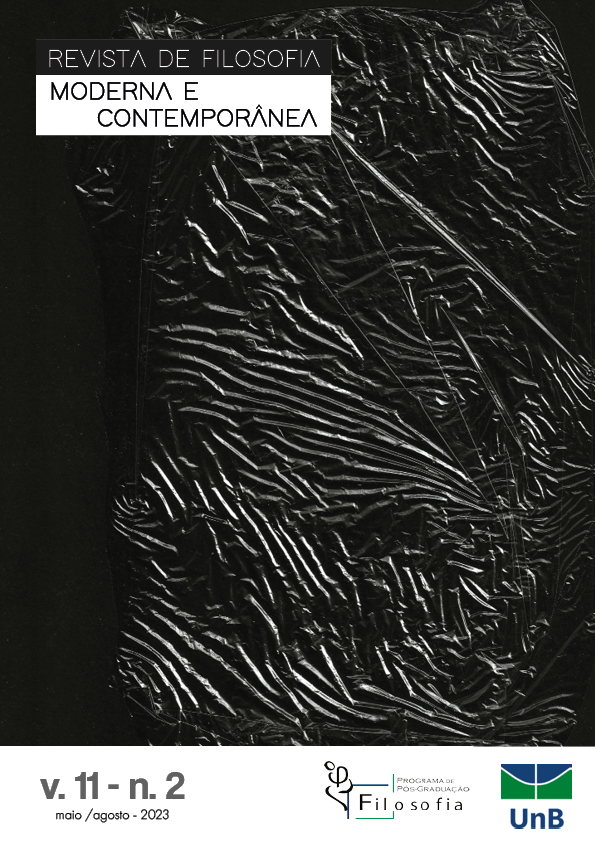Hermeneutics of Heidegger's Phatic Life
DOI:
https://doi.org/10.26512/rfmc.v11i2.53092Keywords:
factic life. Hermeneutics. Phenomenology.Abstract
This article aims to investigate the idea of phenomenological hermeneutics of phatic life in the thought of young Heidegger. The present investigation revolves around answering: what does Heidegger mean by factual life? To what extent is Heidegger’s hermeneutic phenomenology project characterized as a fundamental element to understand the factual life? In order to achieve the proposed objective, a descriptive analytical route of the lectures of the years 1919 to 1923 will be carried out, specifically, Ontology (Hermeneutics of facticity), Phenomenological interpretations on Aristotle: introduction to phenomenological research. With this, Heidegger seeks to understand the factual life, that is, facticity would denote the way of being of our existence, a way that is always and increasingly expressed there, in the occasional (Jeweiligkeit) world. When dealing with facticity, Heidegger approaches it in view of the intentional horizon constituent of the field of manifestation of phenomena, to thus make it possible to think the historically consolidated meanings of the world through phenomenology. In this sense, the Heideggerian commitment to understand facticity is the fundamental element for the development of its phenomenological hermeneutics of facticity.
Downloads
References
CARVALHO, Aurélio Augusto Costa. O projeto de uma hermenêutica da facticidade nos primeiros anos de Freiburg de Martin Heidegger (1919-1923). Monografia de graduação - Centro de Ciências Humanas, Letras e Artes da Universidade Federal da Paraíba. João Pessoa, 2020.
CASANOVA, Marco Antônio. Compreender Heidegger. 5ª. Petrópolis: – Vozes, 2015.
FIGAL, Günter, Oposicionalidade: o elemento hermenêutico e a filosofia. Tradução: Marco Antonio Casanova. Petróplis – RJ: Vozes, 2007.
HEIDEGGER, Martin. "Meu Caminho para a Fenomenologia". In: Sobre a Questão do Pensamento. Trad. Ernildo Stein. Petrópolis, Vozes, 2009.
HEIDEGGER, Martin. La idea de la filosofía y el problema de la concepción del mundo. Barcelona: Herder, 2005.
HEIDEGGER, Martin. Ontologia. Hermenêutica da facticidade. Trad. Renato Kirchner. 2ª ed. Petrópolis, RJ: Editora Vozes, 2013.
HEIDEGGER. Martin. Interpretações fenomenológicas sobre Aristóteles: introdução à pesquisa fenomenológica. Trad. Enio Paulo Giachini, Petropólis-RJ: Vozes, 2011.
HEIDEGGER, Martin. Fenomenologia da vida religiosa. Trad. Enio Paulo Giachini, Jairo Ferrandi, Renato Kirchner. 2ª ed. Petrópolis, RJ: Editora Vozes, 2014.
HUSSERL, E. Ideias para uma Fenomenologia Pura e para uma Filosofia Fenomenológica. São Paulo: Ideias & Letras. 2006.
Husserl, Edmund. Investigações Lógicas: Investigações para a Fenomenologia e a Teoria do Conhecimento. Vol.II. Trad. Pedro M. S. Alves; Carlos Aurélio Morujão. Lisboa, Centro de Filosofia da Universidade de Lisboa. 2007.
KAHLMEYER-MERTENS, R. S. Hermenêutica da facticidade: Contraprojeto à fenomenologia transcendental? In: Diogo Ferrer, Luciano Utteich. (Org.). A filosofia transcendental e a sua crítica. Idealismo, fenomenologia, hermenêutica. 1ed.Coimbra: Imprensa da Universidade de Coimbra, 2015, v. 1, p. 235-258.
KISIEL, Theodore. The Genesis of Heidegger’s Being and Time. Berkeley: University of California Press, 1995.
RODRÍGUEZ, Ramón. La transformación hermenéutica de la fenomenologia: Una interpretación de la obra temprana de Heidegger. Madrid: Editoral Tecnos, 1997.
VILLA MUNOZ, Maximiliano. A caminho de ser e tempo: a virada hermenêutica da fenomenologia. Dissertação (mestrado) - Universidade Federal da Bahia. Faculdade de Filosofia e Ciências Humanas, Salvador, 2017.
Downloads
Published
How to Cite
Issue
Section
License
Copyright (c) 2024 Journal of Modern and Contemporary Philosophy

This work is licensed under a Creative Commons Attribution-NonCommercial-NoDerivatives 4.0 International License.
Copyright for articles published in this journal is retained by the authors, with first publication rights granted to the journal. By virtue of their appearance in this open access journal, articles are free to use, with proper attribution, in educational and other non-commercial settings.


